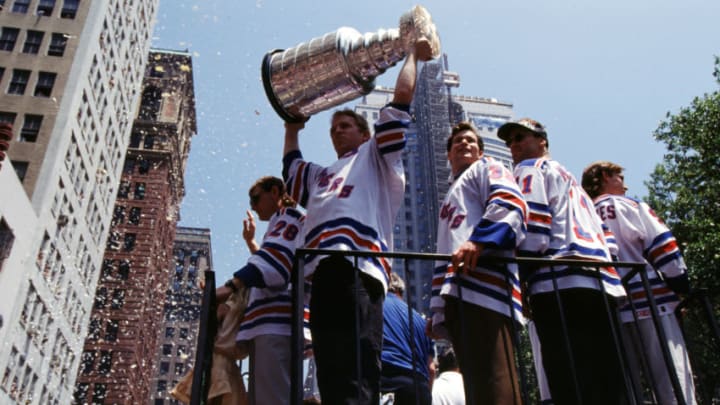
The best New York Rangers, from inception to today
As most New York Rangers fans know all too well, injuries, bad timing, mismanagement, and a cruel amount of rotten luck have conspired to limit the Blueshirts to four Stanley Cup titles since their birth in 1926.
But despite being light in the NHL championships department, the Rangers have boasted plenty of the best players in the game’s history. Some played all or most of their career games on Broadway. Others came during or just after their prime but made a huge impact.
Regardless, there’s no shortage of great players in Rangers’ history, so picking twelve forwards, six defensemen, two goalies and three spares (Black Aces) to construct their all-time team was the relatively easy part.
The difficulty was in measuring the production of players from different eras, especially considering the Rangers rank fourth in NHL longevity (with Chicago and Detroit) behind Montreal, Toronto, and Boston.
In other words, a player who played 44 games per season for 10 years is going to have lower scoring totals than a player of similar caliber who worked 70 or 80 matches per campaign over the same span.
The “play index” on hockey-reference.com was useful in providing “adjusted” totals to account for such disparities.
For example, Hall of Fame center Frank Boucher played for the Rangers from their first season in 1926-27 through the 1943-44 campaign. During that span, he played 533 games, scored 152 times, and assisted on 262 goals for 414 points.
When he began his NHL career, the league had six teams that each played 44 matches per season. By his final year, the schedule was up to 50 contests. Today, of course, the league has an 82-game slate.
Boucher’s adjusted totals are an astounding 273 goals and 864 assists for 1,137 points.
In addition to stats (regular and adjusted), players also received consideration for their length of service, contributions to the franchise, and intangibles such as playing without regard for his own body and coming up big in crucial times.
There almost certainly are players left off this roster that will raise eyebrows.
However, the maximum players an NHL club can have on its active roster is 23. Therefore, the same applies to this Rangers’ all-time team. Otherwise, how credible would any all-time team be if dozens of honorable mentions were included?
Might as well list everybody (yawn).
The intent here is not to slight or diminish the accomplishments of those who consistently played hard and very well while wearing a Rangers’ sweater. Rather, it’s as simple as “can’t take everybody.”
Born on this day in 1920 - Honoured Member Chuck Rayner (pictured centre) #HHOF pic.twitter.com/qojFJsXClJ
— Hockey Hall of Fame (@HockeyHallFame) August 11, 2018
One deserving player who didn’t qualify is goalie Chuck Rayner.
He’s unquestionably one of the best netminders in Rangers’ history. He was elected to the Hockey Hall of Fame and won the Hart Trophy in 1950 despite playing behind lousy Ranger teams in each of his eight seasons on Broadway (1945-46 through 1952-53).
How bad were the Rangers during Rayner’s tenure?
They finished sixth (last) three times, fifth three times and fourth twice (making the playoffs both times). One playoff berth came in 1949-50 when the Rangers were among four postseason clubs despite a 28-31-11 regular season in which they scored a league-low 170 goals.
New York also finished 10 points behind Montreal that season, yet knocked off the Canadiens in five games in the Semifinals before losing to Detroit in seven in the Finals.
The Rangers nearly won the Cup against a first-place Red Wings team that led the league with 229 goals – and despite having to play five games at Detroit’s Olympia Stadium (including the final four matches) and twice at Toronto’s Maple Leaf Gardens because the circus was occupying Madison Square Garden.
Yet still took Detroit two overtimes of Game Seven to win. All thanks to Rayner, who posted a 2.25 goals-against average and one shutout that postseason.
Overall, he posted a 123-179-73 record, 2.98 GAA, and 24 shutouts in 377 games for the Rangers, though his adjusted GAA is 3.20. Exceptional given the teams he played behind, but would you take him over Henrik Lundqvist, Mike Richter, or Eddie Giacomin?
So, here’s my Rangers’ all-time team.
Players are listed with years and regular-season stats as a Blueshirt. The NHL’s 23-man active roster limit applies. Hockey Hall of Fame members noted with HOF. Skinny notes are from hockey-reference.com and the Official Guide to the Players of the Hockey Hall of Fame.
